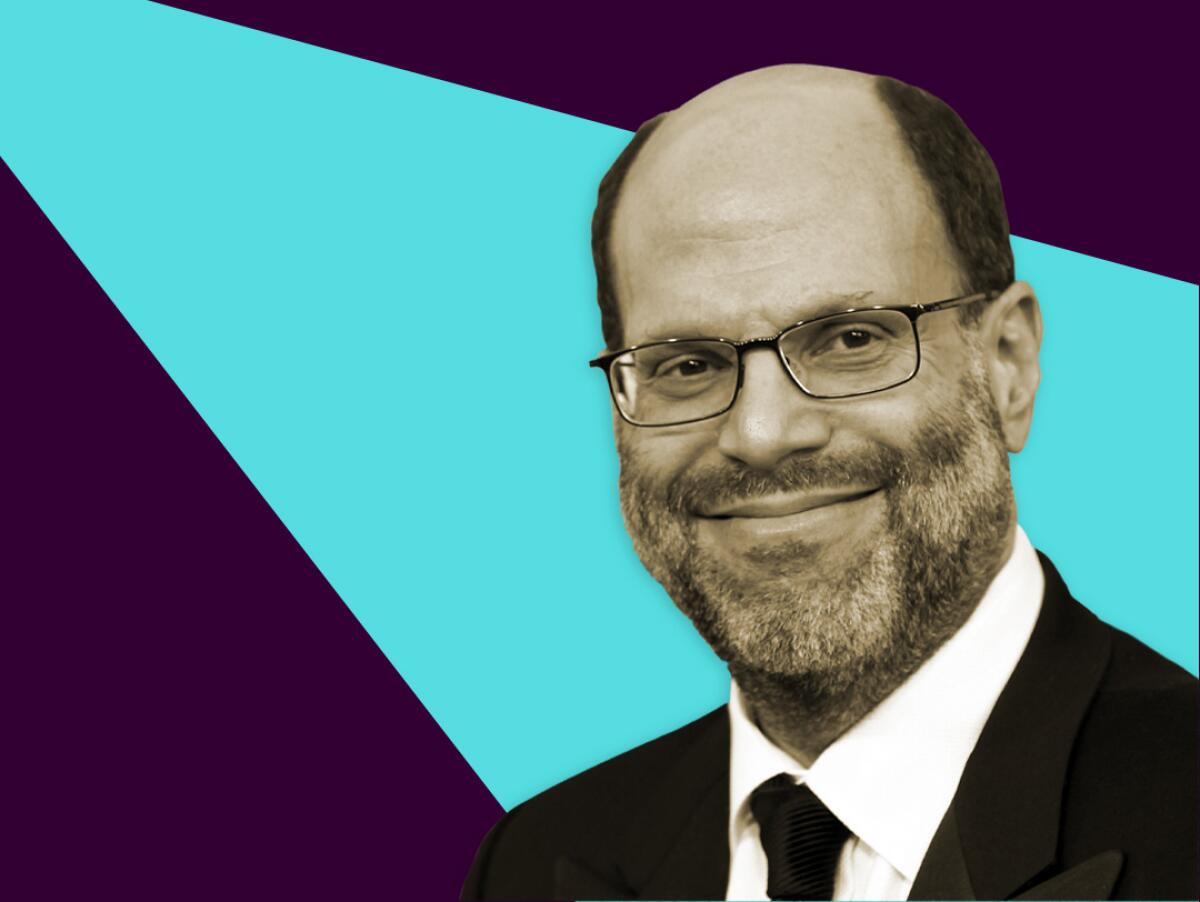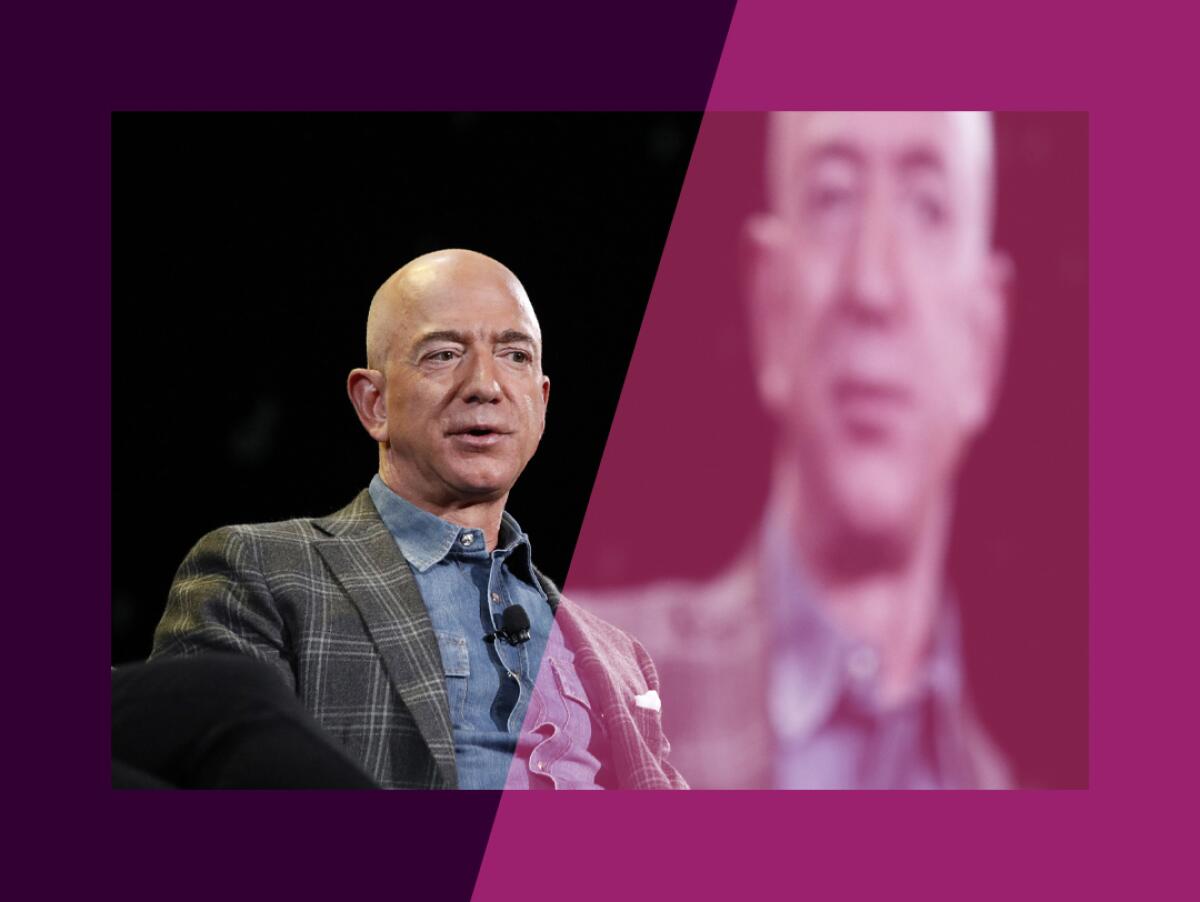ICM troubles expose ‘an entire entertainment industry problem’

- Share via
This is the May 11, 2021, edition of The Wide Shot, a weekly newsletter about everything happening in the business of entertainment. Sign up here to get it in your inbox. If you enjoy it, please tell your friends.
As Hollywood prepares to go back to offices, it’s clear that there’s still much to be done to change workplace culture.
In recent months, what started with the #MeToo movement against sexual harassment has expanded to cover broader categories of toxic work environments.
We wrote about this evolution after allegations of bullying behavior by Scott Rudin, who stepped back from Broadway and Hollywood projects after an exposé in the Hollywood Reporter about his treatment of employees.
Before that, two high-level CBS Television Stations executives lost their jobs after a Los Angeles Times investigation revealed a pattern of racism, sexism and bullying.
The latest example of a company under scrutiny comes from my colleague Wendy Lee, who, after a months-long investigation, published a thorough report on the internal culture of talent agency ICM Partners.
Inside the business of entertainment
The Wide Shot brings you news, analysis and insights on everything from streaming wars to production — and what it all means for the future.
You may occasionally receive promotional content from the Los Angeles Times.
“More than 30 former and current ICM employees said in interviews that the company tolerated a hostile work environment, where women and people of color were subjected to harassment, bullying and other inappropriate conduct,” Lee reported. “Since 2017, nearly a dozen women reported allegations of mistreatment by male agents and managers companywide to ICM Partners’ human resources department or senior leaders, according to interviews with the women and those with direct knowledge of the incidents.”
The agency said it “does not tolerate harassment, bullying or other inappropriate conduct. HR investigates all reports received and addresses each with appropriate disciplinary measures up to and including dismissal.”
Three female ICM board members — Lorrie Bartlett, Jennifer Joel and Janet Carol Norton — acknowledged the challenges, but said, “We feel privileged to enjoy both a safe and encouraging environment, fair and abundant opportunities, and the respect and support of all colleagues of all genders. With them, we continue to be engaged in a concerted effort towards a better and more equitable culture that will have broad, deep and longstanding effects on our peers and our clients.”
The rough-and-tumble reputation of the talent agencies is the stuff of legend, but the biggest companies themselves had so far largely avoided the #MeToo spotlight.
That’s despite an open revolt among Hollywood assistants starting as far back as fall 2019, when #PayUpHollywood took off in an effort to improve pay and working conditions. My colleague Stacy Perman wrote then about low-level employees fed up with poor wages and mistreatment. In that story, a former assistant at an unnamed talent agency said she worked 50-plus-hour weeks for $11.25 an hour and was subjected to constant verbal abuse by a boss. When she complained to HR, she was told, “Maybe this industry isn’t right for you.”
It remains to be seen what fallout will come from the ICM revelations or any of the stories about abusive workplaces in the entertainment industry. For Rudin — whose penchant for shouting, “soft firings” and throwing office supplies was known long before last month — the response from Hollywood luminaries has been muted.

No one ever said breaking into show business was supposed to be easy, but it’s clear there’s a new generation that expects far better treatment from their employers.
Hollywood’s dues-paying culture has encouraged what amounts to a generational hazing ritual, a practice of newbies suffering through mistreatment to get their feet in the door, only so that those who make it through can lord over the next group of underlings. This has created a pyramid scheme of poor behavior that is only now starting to crumble.
There’s a growing recognition of how these longstanding practices of meager pay and mistreatment prevent people of color and other underrepresented groups from getting ahead.
“It’s an entire entertainment industry problem that you have these jobs that pay so little,” former ICM mailroom clerk Miguel Parreño told Lee. “You need certain experience to get in the door, and a lot of the higher-level jobs and other studio-level jobs require the agency to be basically a clearinghouse for job opportunities, and the only way to get into those opportunities is through a very white lens.”
For the record: Last week I wrote that Spanish-language giant Univision acquired Grupo Televisa. To clarify, Univision acquired Televisa content and media assets.
More stuff we wrote
— Daft Punk liberally sampled a 1979 disco track for its megahit “One More Time.” The man behind the original tune hasn’t seen a dime, reports August Brown.
— Elon Musk hosted “Saturday Night Live,” and it was mostly fine. Robert Lloyd captures the gimmicky ratings grab in his review. For what it’s worth, the price of jokey cryptocurrency Dogecoin plummeted.
— The Spanish-language streaming wars are reaching a new level. Telemundo has launched a Spanish-language streaming studio to meet growing demand “as U.S. media giants, including Telemundo’s parent company, NBCUniversal, are looking to bolster their offerings,” Meg James writes.
— A new film studio is coming to Hollywood — and not a moment too soon for eager creators, reports Roger Vincent. Real estate developer David Simon wants to build Echelon Studios on the site of a long-closed Sears store and parking lot built in 1951 on Santa Monica Boulevard, west of the 101 Freeway.
— Columnist Mary McNamara on what it’s like returning to the movies while fully vaccinated: “I was at the movies and for two glorious hours all I could do was watch and listen and be.”
The week in Globes chaos

Well, a lot has happened with the Hollywood Foreign Press Assn. since the group approved a series of reforms in response to criticism after a Times investigation. Were the reforms enough to save the group behind the Golden Globes, we asked at the time?
Maybe not.
In a stunning turn of events, NBC on Monday said it would not air the boozy awards show in 2022. “We continue to believe that the HFPA is committed to meaningful reform,” the network, which has aired the awards show since 1996, said in a statement. “However, change of this magnitude takes time and work, and we feel strongly that the HFPA needs time to do it right.”
The decision came after a steady drip of blowback against the HFPA within an industry that until recently seemed happy to use the show as a springboard for awards hopefuls.
Time’s Up called the HFPA’s reforms “window dressing,” and a coalition of more than 100 publicity agencies said they would continue to withhold access to stars. Netflix, Amazon Studios and WarnerMedia — big campaigners throughout awards season — distanced themselves from the organization, revealing that they would cut ties with the HFPA until it goes further in its plan to remake itself. Celebrities including Scarlett Johansson spoke out. Tom Cruise handed back his trophies.
The decision to cancel next year’s broadcast promises to shake up awards season, in which the Globes has for years served as a precursor to the Oscars. That status has now been threatened after The Times’ February investigative report that revealed allegations of self-dealing and a lack of any Black members in the 86-person organization.
For more context, listen to Perman and Josh Rottenberg, who broke the original story, on the new Times podcast.
Number of the week

Shortly after the one-year anniversary of Fox Corp. buying the free streaming service Tubi, the media giant says it is feeling good about its bet.
Fox bought the ad-supported platform for $440 million at a time when streaming with commercials (ad-based video on demand, or AVOD) was still the Jan Brady to subscriptions’ Marcia. Now, the media business is all, “AVOD, AVOD, AVOD.”
In its third-quarter earnings call, Fox raised Tubi’s revenue guidance to $350 million for fiscal 2021 (its current fiscal year), a $50-million boost from the $300 million it previously projected. Fox Chief Executive Lachlan Murdoch told analysts that Tubi will become a billion-dollar revenue business “in the coming years.”
The confidence comes after a quarter when Tubi, which hosts free movies and shows, along with Fox shows like “The Masked Singer,” reported 798 million hours of video streamed during the quarter, up 54% from the same period last year. March accounted for 276 million streaming hours alone, representing the service’s best month, the result of increased content and promotion.
And Fox is doubling down. Tubi recently expanded its local news offerings and declared its entry into the original content space, including documentaries from Fox Alternative Entertainment and animation from “Bob’s Burgers” studio Bento Box. The company also announced a deal to stream nearly 40 movies from Drafthouse Films and Giant Pictures.
It’s easy to see why ad-supported services are attractive for consumers and media companies. People are flooded with streamers asking them to pay $5 to $15 a month, so ad-based services are a good alternative for the budget-conscious. Paramount+ and HBO Max are offering cheaper versions of their services with commercials.
Other free streamers are growing too. ViacomCBS last week credited its free streaming service Pluto TV with leading a 62% year-over-year surge in streaming ad revenue in its most recent quarter. Pluto’s revenue more than doubled from a year earlier. The unit added 6 million monthly active users, for a total of 50 million.
Interestingly, one analyst asked Murdoch whether the company was simply taking money from one pocket (traditional TV) and putting it in the other (streaming). Murdoch’s answer, unsurprisingly, was “absolutely not.” He added, “What Tubi allows for us, and frankly for any advertiser that’s also advertising in broadcast, it allows them to increase their reach dramatically.”
A key stat: The median age of Tubi’s viewership is 37, or 20 years younger than that of linear TV, Fox said. These are audiences regular broadcasting doesn’t reach.
AMC dares to meme
AMC Entertainment, the world’s largest movie theater chain, became a beloved stock of social media-savvy traders earlier this year when it looked like the Leawood, Kan.-based exhibitor might be on its last legs. The company raised money by selling shares on the upswing. Rocket emoji!
And it looks like Adam Aron, chief executive of AMC, is fully onboard with the memestock phenomenon.
Aron’s most recent earnings call was the clearest sign yet that AMC sees its 3.2 million individual shareholders as its new boss, after Beijing-based Wanda ceded control. And Aron is playing to the crowd.
“Just go on Twitter, just go on Reddit, just go on YouTube, read what these people write,” Aron told analysts. “They love AMC. And these are not people who are just going to be investors in AMC. These are going to be customers of AMC who come to our theaters and enjoy watching movies at our theaters as paying guests.”
In another nod to the online investors, Aron announced that he and AMC would donate a combined $100,000 to the Dian Fossey Gorilla Fund, a favored nonprofit of WallStreetBets.
Donating to a conservationist nonprofit because it will play well on the subreddits may seem like odd CEO behavior from the outside. But doing so because it’s something your biggest shareholder block cares deeply about is less weird.
Additional movie stuff:
- Cinemark theaters will play Netflix’s “Army of the Dead” for one week before it hits streaming.
- New agreements between the major studios and Cinemark foreshadow a world of shorter theatrical windows.
- A Sony movie, “Cinderella,” goes to Amazon.
More top stories

— The untold story of how Jeff Bezos beat the tabloids. When a gossip rag went after the CEO, he retaliated with the brutal, brilliant efficiency he used to build his business empire. (Bloomberg with the excerpt from Brad Stone’s book, “Amazon Unbound.”)
— Wide-angle oddity: Giant Bidens meet tiny Carters. A picture of two presidents and first ladies led to many Hobbit jokes online. The New York Times explains what happened.
— Inside TikTok’s tumultuous rise — and how it defeated Trump. One of the world’s hottest startups, the social media app has faced plenty of corporate drama both inside and outside the company, according to interviews with more than a dozen current or former employees. (Forbes)
— Netflix and HBO Max want to put you to sleep. As Headspace and Calm move into TV production, they face a unique set of challenges when falling asleep is a metric of success. (IndieWire)
Finally ... a John Prine tribute
Country singer and guitar hero Sturgill Simpson covers John Prine’s “Paradise” in honor of the late songwriting legend for the upcoming album “Broken Hearts & Dirty Windows: Songs of John Prine, Vol. 2.” BONUS TRACK: The director’s cut of Prince blowing minds on “While My Guitar Gently Weeps,” now with more Prince!
Inside the business of entertainment
The Wide Shot brings you news, analysis and insights on everything from streaming wars to production — and what it all means for the future.
You may occasionally receive promotional content from the Los Angeles Times.




